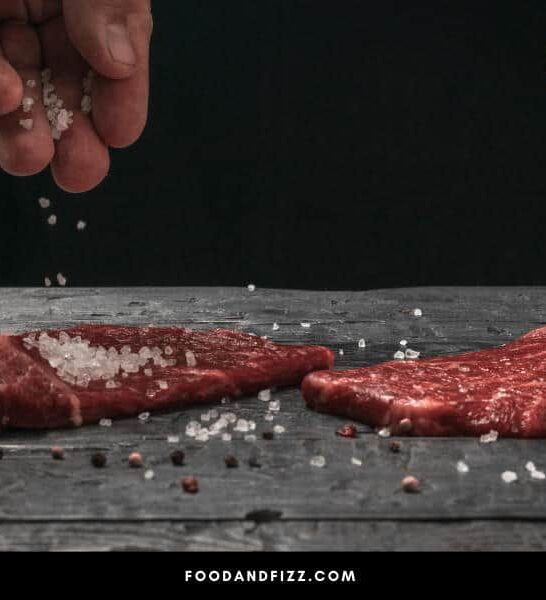There’s nothing quite like the taste of a perfectly cooked steak. But how do you make sure your steak is perfect?
One question that often comes up is whether or not to rinse the salt off the steak before cooking. In this article, we’ll answer that question and tell you what happens if you don’t rinse the salt off.
Do You Rinse Salt Off Steak Before Cooking?
You should not rinse the salt off your steak before cooking because the salt helps pull the moisture from inside the steak to the surface. You’ll have a better chance to get a seared outer layer if you keep the salt on the steak before cooking.
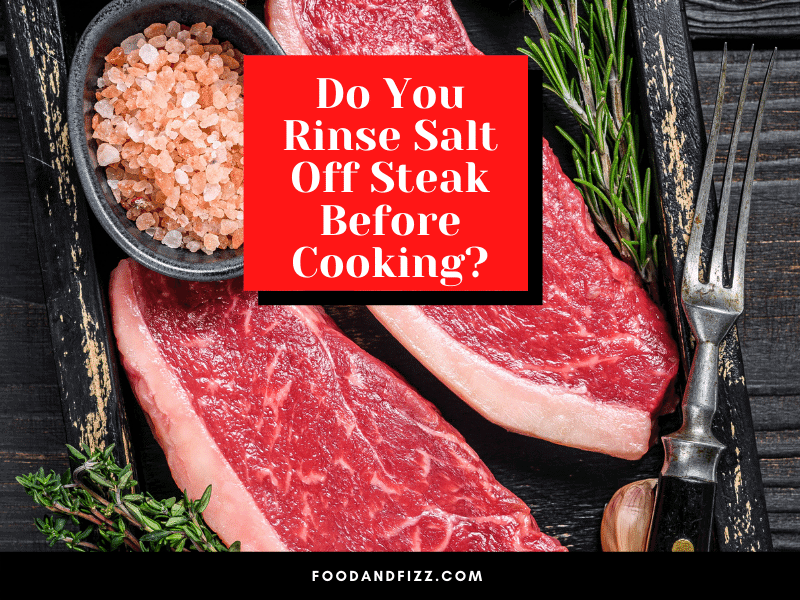
Why Do People Add Salt to A Steak?
When salt is added to a steak, it helps to break down the proteins in the meat. Salt is able to do this by causing the proteins to unwind and bind to each other.
This process is known as denaturing. The salt also helps to tenderize the steak by breaking down the muscle fibers.
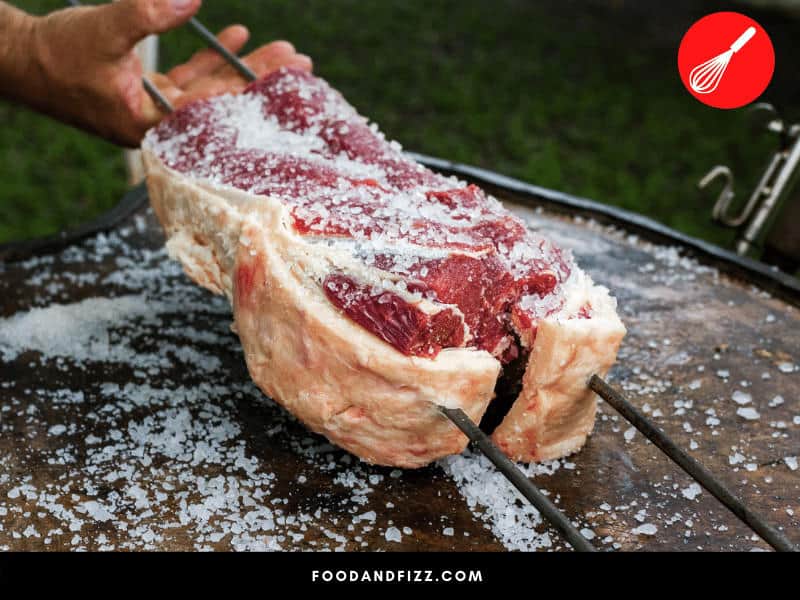
This gives the steak a tender texture. The salt also helps to bring out the flavor of the steak. It will pull out the juices from the steak and help to create a crust on the outside of the steak when it’s cooked.
The more cooked outer layer helps to give the steak more difference in texture. You’ll have a tender and juicy inner layer with a crispy outer layer.
It also helps to secure all the moisture inside the steak from coming out. It creates a hard barrier that keeps the juices inside the steak.
This is why people like to let the steak sit for about five minutes after cooking. The juices have a chance to absorb back into the meat after being released during the cooking process.
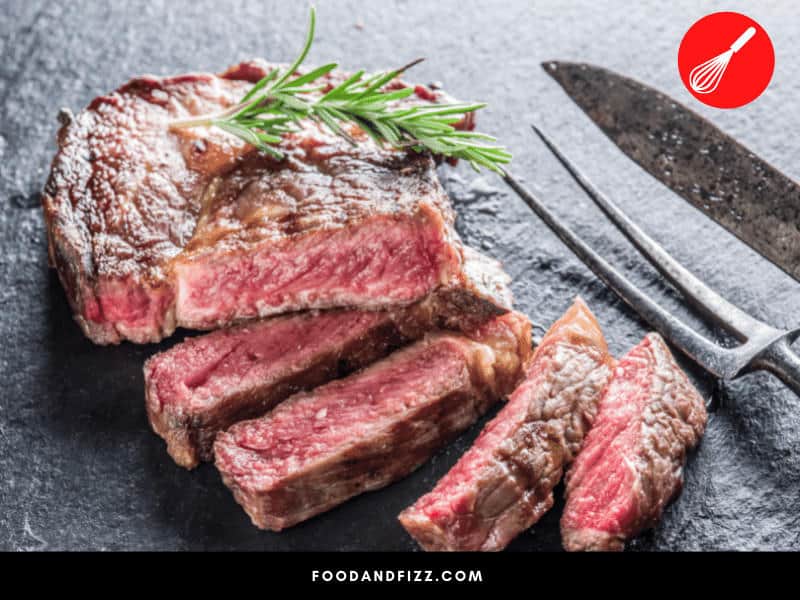
How Do You Remove Too Much Salt On A Steak?
If you’re worried about your steak being too salty, you can soak it in cold water for about an hour. This will help to remove some of the salt from the steak.
The salt will eventually absorb into the meat which will make it harder to remove completely but soaking your steak should help remove some of that flavor.
You can also rinse the steak with cold water and pat it dry before cooking. This will remove some of the salt, but not all of it.
It’s important to note that if you rinse the steak, you’ll need to add more salt before cooking. This is because the salt helps to create that outer crust mentioned earlier.
If you’re trying to remove just a small amount of salt on your steak then you could take a damp napkin and try patting the steak.
This will help remove a smaller amount of salt compared to rinsing it underwater or giving it a cold water bath.
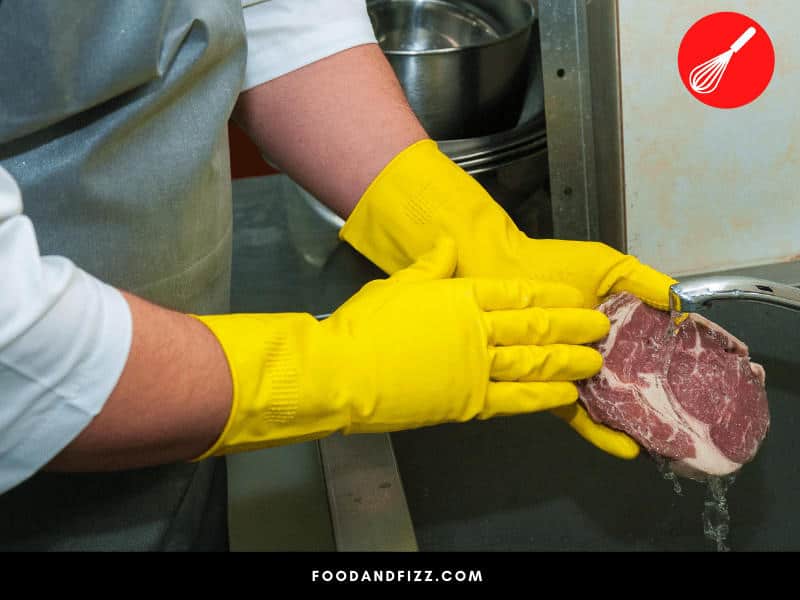
Should You Salt the Steak After Cooking?
You can always put a little extra salt on your steak after it is done cooking. The additional salt will add a little more flavor rather than altering the steak itself.
Adding salt after the steak has cooked won’t change the texture or make it more tender.
It will simply add a little extra flavor to the steak if you find that it needs it. You can also add other spices after cooking like pepper.
These will all help to give your steak a little extra flavor without changing the texture.
The best way to add salt after cooking is to give your steak a try first. That way you can determine how much extra salt you need to add to the steak.
You might find that you salted the steak perfectly and you don’t really need to add any extra.
If you do add extra salt after cooking try adding a small amount at a time. Once you add a little, try another bite, then repeat the process until you’ve reached the perfect amount of salt for your steak.
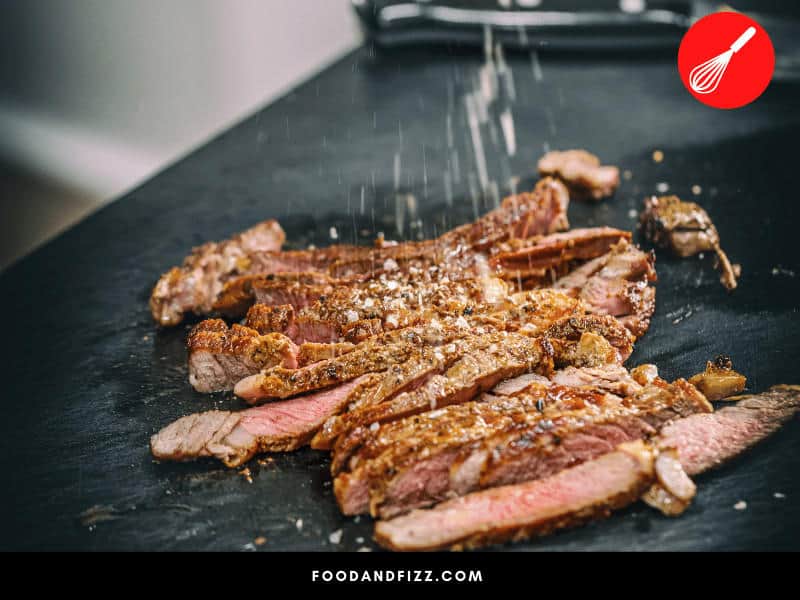
How Do You Know If You’ve Added Too Much Salt?
Practice will help you determine how much salt to add to a steak but an easy way to tell is if you see more white than red.
The steak itself should be showing through more than the salt crystals so if you’ve added so much salt that you see mainly white, you’ve added too much.
Another way is to rub your hands over the steak. If you feel a pile of salt gathering on your steak then chances are you’ve added too much.
You should feel the salt on the meat but there shouldn’t be any huge piles of salt that cover the steak completely.
Try to rub the salt crystals over the steak evenly so that each piece of meat gets treated evenly.
Rinsing Salt Off A Steak
You should never have to rinse the salt off a steak before cooking it. The salt will help to create a flavorful and tender steak. If you’re worried about the steak being too salty, you can soak it in cold water for about an hour.
This will help to remove some of the salt from the steak. Or, you can rinse it under cold water for a little to remove some of the salt.
Frequently Asked Questions on Do You Rinse Salt off Steak Before Cooking?
How long do you leave salt on a steak?
You can pre-salt a steak up to 24 hours in advance. Just make sure to keep it refrigerated so that the salt doesn’t pull too much moisture out of the steak.
How much salt do you put on a steak?
A good rule of thumb is to use about a teaspoon of salt per pound of meat. So if you have a one-pound steak, you’ll use one teaspoon of salt.
Should you pat a steak dry after salting?
You should pat your steak dry before salting it but not after. The salt will help to bring moisture to the surface of the steak and patting it dry will ruin the crispy outer layer achieved when cooking.
How do you store a steak after salting it?
Once you salt the steak, you’ll want to store it in a baggie in the fridge. This will keep it fresh while also allowing it to fully absorbed the flavors of the salt and rest in the juices that come from the steak.

